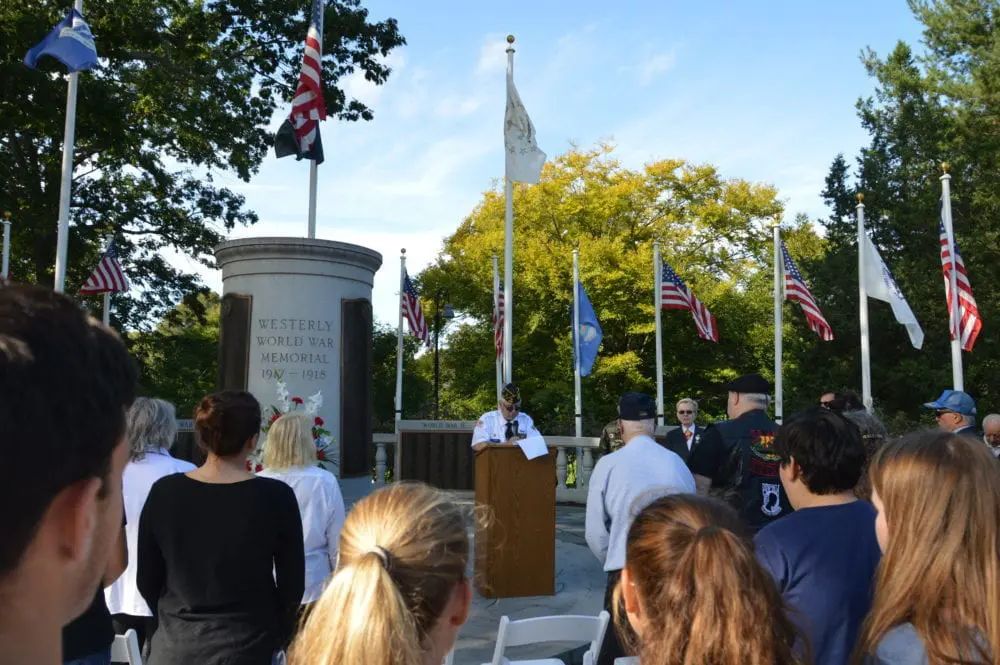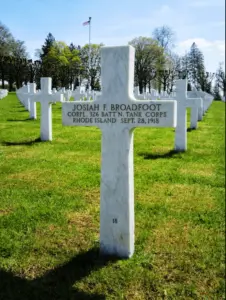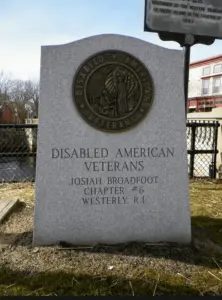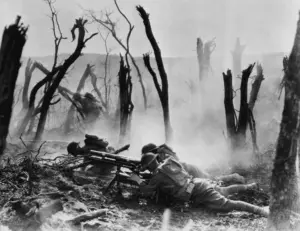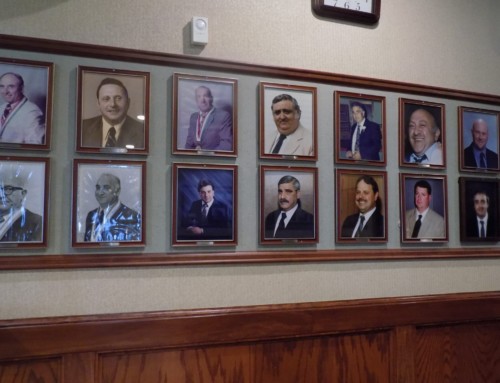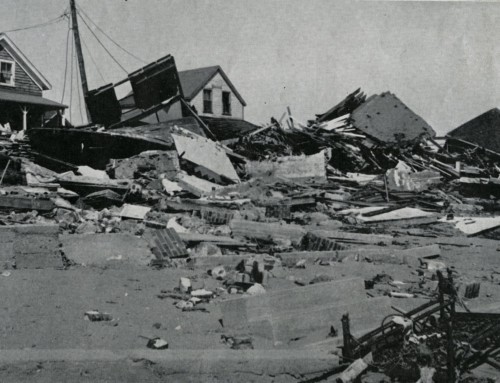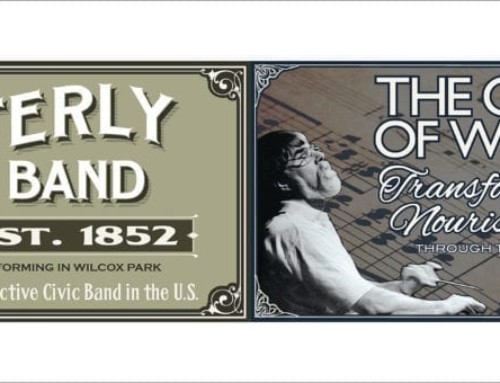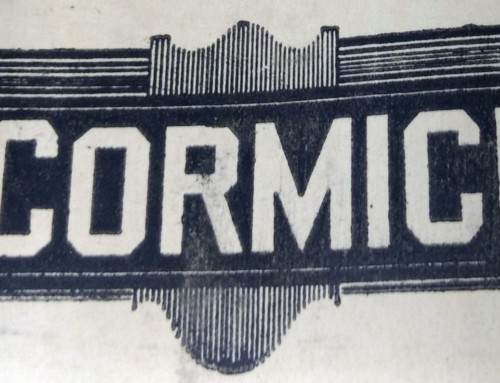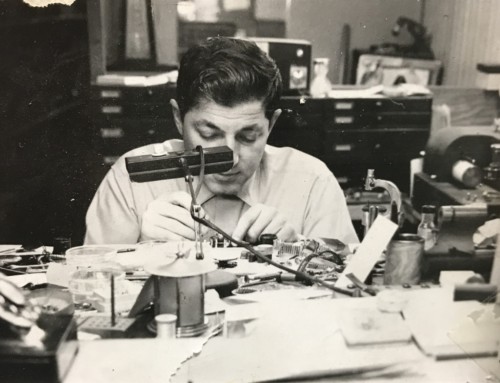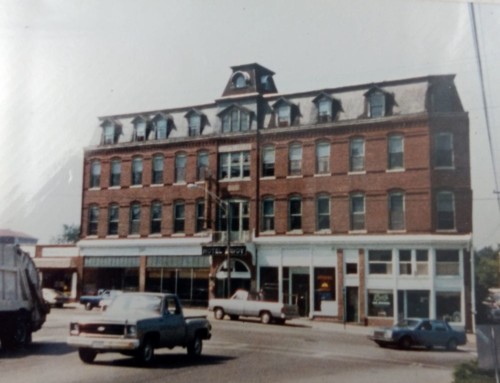Legend has it two lovers were walking along the banks of the Danube River when the man, seeing some bright blue blossoms, reached down to pick the flowers for his lady. The bank was slippery and he fell into the river. As he was being swept away by the current he called out to the woman not to forget him. This is one of the many myths surrounding the little blue Forget-Me-Not flower. The Forget-Me-Not is used as a symbol for those that have been lost and for those that are less fortunate. It seems fitting that the Disabled American Veterans (DAV) use this flower as a symbol of the heroes that have sacrificed in service to their country.
September 27, 2018 marks the 100th anniversary of the death of Westerly native Josiah Ferguson Broadfoot who fought and died a hero in World War One. A war that today is almost lost to the memory of men with the death of the last surviving combat veteran in May 2011. The Disabled Veterans of America (DAV) Josiah F Broadfoot-Chapter #6 will honor him and fellow Westerly native Harley Philip Chase along with the other 21 service members killed from Westerly and Pawcatuck.
The First World War lasted for four years from August 1914 to November 1918. It was one of the largest wars in history with 70 million personnel taking part. There were almost 10 million military deaths and 9 million civilian deaths directly attributable to the war. An almost forgotten footnote was the additional 50 to 100 million deaths from genocide and the 1918 influenza epidemic that the war contributed to. 4,734,991 US service members served in the war resulting in over 116,000 US service member deaths. An additional 204,004 US service members were wounded.
Broadfoot was born February 13, 1889 in Westerly. His parents emigrated from Scotland in the 1880s and became naturalized citizens. His father was employed as a stonecutter and his mother worked at home. The 1910 Census shows Josiah Broadfoot, then 21 years old and single, living with his parents and his siblings in their home at 27 West Street, Westerly.
After joining the Army he was sent to France and served as a corporal in Company B, 344th Battalian, Tank Corp. He was killed toward the end of the war in the Meuse-Argonne campaign near La Forge Farm, France. His army unit was pinned down by enemy machine gun nests and no advance was possible. Broadfoot volunteered to take a tank and attack the machine gun nests. After his tank became disabled he proceeded to advance on foot until he was mortally wounded. He was awarded the Distinguished Service Cross for exceptional heroism in action.
The actual citation reads; The Distinguished Service Cross is presented to Josiah Broadfoot, Corporal, U.S. Army, for extraordinary heroism in action, September 27, 1918. Corporal Broadfoot volunteered to drive a tank, and his services being accepted, he attacked enemy machine-gun nests until his tank was put out of action, destroying several enemy nests which had held up our infantry. He then continued the advance on foot until he was fatally wounded. General Orders 89, War Department. The Josiah Broadfoot Chapter 6 of the Disabled American Veterans (DAV) in Westerly is named in honor of him.
The day before Broadfoot was killed another Westerly native was also fatally wounded. He was Harley P. Chase. Chase was born December 11, 1895 in Westerly RI and lived at 147 Canal Street, the son of Mr. & Mrs. Edgar M. Chase. At age 21 he was single and employed as a letter carrier for the US Postal Service at the Westerly Post Office.
At age 23 he was listed as US Army Private 1st Class in Co. E, 314th Infantry, 79th Infantry Division. He was killed in action on September 26, 1918, while serving in France with the American Expeditionary Forces. The Harley Philip Chase VFW POST 1265 in Pawcatuck, CT is named in honor of him.
The first Westerly native to be killed in the war was John J. Turano born in Westerly on June 26, 1898. He enlisted in the U.S. Army in 1917 and was sent to France assigned to Company 1, 23rd Infantry Regiment, Infantry Division AEF. During the battle for Vaux Turano’s company commander lay wounded in the open. Turano attempted to shield his commanding officer with his body and was killed. For his act of heroism and ultimate sacrifice, John Turano was awarded the Distinguished Service Cross and the French Croix DeGrerre with Palm.
The WWI Memorial is located at the corner of Grove Avenue and Granite Street in Wilcox Park. It was dedicated on Armistice Day in 1937 with the names of those who served in World War I from Westerly and Pawcatuck inscribed on a bronze plaque. This memorial was modified in 2002 to include bronze plaques on the buttresses with the names of those who served in World War II, the Korean War, and the Vietnam War.
Even though 100 years have gone by since the Great War we should not forget these brave servicemen who gave their lives for this country. DAV Chaplain Anthony Lombardo will read each name of the 23 names and the veterans will respond, “Killed in action, Sir.”
The names from Westerly are;
Harley Philip Chase, Josiah Ferguson Broadfoot, Wallace C Craig, Joseph Denton, Mario Galli, Ralph Giorano, Daniel A Hunter, Harold W Merrill, Arthur Marsden, Charles Marsden, Harry W Moone, Alexander Smith, John J Turano and Frank J Foley.
The names from Pawcatuck are;
Joseph A Ozanne, Clarence Roberts, Harry H Sutcliffe, Ira A Snyder, Carl E Roode, Joseph Bourdeau, Harry E Burdick, John W Holdsworth and Ernest Tetlow.
WWI was so terrible that it became known as the war to end all wars. Unfortunately, this was not to be and many more wars have come to pass since then. Think of the sacrifices these veterans have made and wear the pin with the Forget-Me-Not flowers proudly on this and other Veteran’s Days to honor them.
